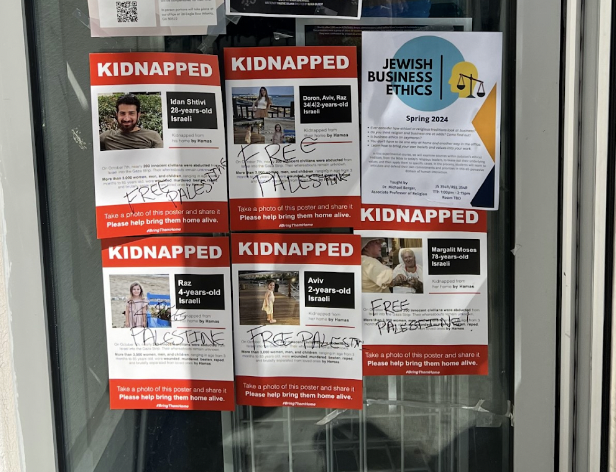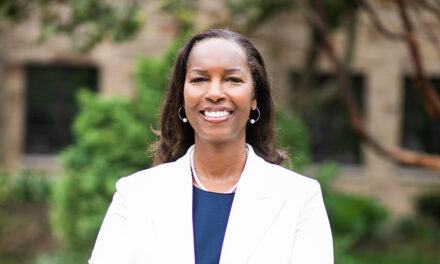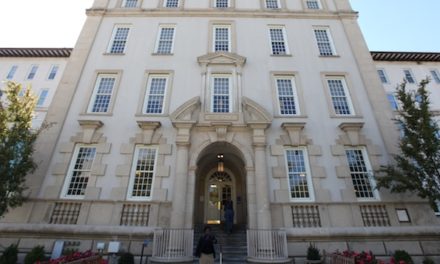As tensions about the Israel-Hamas war continue on campus, Emory University garnered attention on social media after fliers raising awareness for Israeli civilians being held hostage in Gaza were vandalized on Oct. 24. The fliers hung on campus for a few days before students noticed that “FREE PALESTINE” had been written across the pages in black marker.
The University Senate’s Committee for Open Expression is currently reviewing the incident, Assistant Vice President of Communications Laura Diamond wrote in a Oct. 26 email to The Emory Wheel. Diamond said that they have no further information to share at this time, including whether the Emory Police Department has been able to identify the individual or group behind this act of vandalism.
“Emory will continue to prioritize the well-being of our community, to promote open expression for all perspectives, and to encourage dialogue that acknowledges our shared humanity,” Diamond wrote.
The day after the posters were defaced, students organized a “Stop Cop City” and pro-Palestine protest. University President Gregory Fenves later critiqued the rally for including “antisemitic” phrases in a University-wide email on Oct. 25. Emory Israel Public Affairs Committee Senior Advisor Cassidy McGoldrick (24C) said she noticed that the fliers were no longer posted after the protest, although she is unaware of who took them down or when.
“It’s caused a lot of division,” McGoldrick said. “Everyone, regardless of their level of knowledge or education on the conflict, has an extreme stance when at the end of the day I think the conflict itself is very complicated and requires a lot of education and background knowledge to feel justified in supporting claims that you make.”
Committee for Open Expression Chair Ilya Nemenman explained that vandalizing the fliers violates section 8.14.5.8 of Emory’s Respect for Open Expression Policy, which states that Emory community members “who defaces the open expression of others will be held in violation of this policy.” The section includes chalkings, fliers, signs and “displays” as examples of “nonpersonal expression” protected under this policy.
“Interfering with somebody else’s speech, or doing things that are potentially violations of various local, state, federal laws are definitely not protected by the policy,” Nemenman said. “It would be very useful for people to actually read the policy before they choose to express themselves in this situation where tensions are running high and there is a lot of conflict.”
McGoldrick said she hopes that whoever vandalized the fliers receives disciplinary actions.
“We’re more just waiting to see how they hold people accountable for their actions, to make sure it’s not just a safety net, almost,” McGoldrick said. “We want action to be taken.”
Student response
Rami Fabian (25B), one of the students who put up the fliers, said that the issue of Hamas taking Israeli hostages is important to him as a member of Emory’s Jewish community.
“I have family and friends who do know some of the people being held hostage, and this felt like beyond an Israel-Palestine issue,” Fabian said. “This is just a human rights thing. We want our family to come home.”
While Fabian said he seeks peace and nuance in the situation, he said he found the vandalization “disrespectful … to all the people hurting in Israel.”
“I do want peace and I do want a free Palestine and a free Israel and I want us to coexist, but this is just not the way that that can happen,” Fabian said. “I don’t think writing ‘Free Palestine’ over the faces of hostages is conducive to anything.”

Vandalized fliers raising awareness for Israeli citizens taken hostage in Gaza hang in a window on campus. (Courtesy of Rami Fabian)
Israel Public Affairs Committee President Sophie Kalmin (26C) expressed a similar sentiment.
“It’s dehumanizing,” Kalmin said. “I find it so incredibly offensive. It breaks my heart that that’s what is considered activism and that’s what is considered acceptable.”
Emory Students for Justice in Palestine (ESJP), who requested to remain anonymous for safety purposes, wrote in an email to the Wheel that they stand in “complete opposition” to the vandalization of the fliers around campus.
“Ever since the beginning of this new iteration of violence in Gaza, we have repeatedly stressed to our members to respect this practice of open expression at Emory, which is afforded to all members of the Emory community,” ESJP wrote. “We believe in the importance of upholding open expression standards at the University under all circumstances, and especially during times of heightened tensions.”
However, antisemitism on campus has not been limited to the fliers, McGoldrick said. She pointed to the Oct. 25 “Stop Cop City” protest as an example, referring to a student’s sign that said “Colonizing Oppressive Pigs.” Although the protest was originally intended to oppose the University’s ties with the Atlanta Public Safety Training Center, protestors linked this issue with the Israel-Hamas war, calling on the president to acknowledge the Palestinian lives lost in the conflict.
McGoldrick said she believes the sign was antisemitic, noting that comparing Jewish people to pigs is a “common antisemitic trope.” She said that some people — including Emory Stop Cop City — have claimed that the sign, which also said “F*** Cop City,” was only referring to the police and not Israel, but she believes this is a “weak” argument.
“I don’t think you can make that justification while you’re holding it up, chanting, ‘From the river to the sea,’” McGoldrick said. “Simultaneously, I’ve never heard a cop being called a colonizer before, whereas I’ve heard Israel be called colonizers or oppressors.”
McGoldrick said that while the protestors may not have had the intention of being antisemitic, they have the obligation to apologize.
Next steps
The University does not currently have a concrete definition of antisemitism, according to McGoldrick. In the past, Jewish and Zionist advocates have proposed the International Holocaust Remembrance Alliance definition, which characterizes antisemitism as “a certain perception of Jews,” expressed with hatred and in both rhetorical and physical forms. The definition has not been approved by the University. Other schools, like Georgia Institute of Technology and Duke University, have adopted this definition.
“With the rising number of antisemitic incidents on campus as a result of the conflict in the Middle East, I think that it provides the grounds for the administration to reconsider adopting it,” McGoldrick said.
According to McGoldrick, there is a need for greater communication about antisemitism. She added that all students have the right to express their opinion on the conflict.
“I fear that when we tell people what they’re saying is antisemitic, it is being perceived as you’re not allowed to advocate for Palestinian rights and for a homeland for the Palestinians,” McGoldrick said. “I truly don’t think that it’s mutually exclusive. You can advocate for a free Palestine and a Palestinian state without being antisemitic.”
Fabian said he hopes people understand the struggle of the Jewish community as of late.
“I urge people to understand that this is the hardest time possible for the Jewish community around the world and antisemitism is growing at a tremendous rate like we haven’t seen since the Holocaust,” Fabian said. “The Jewish people as a whole just want peace and that’s all I’m praying for, is just somehow we can get to peace in the future and not have to deal with terrorism and be able to coexist one day.”
Lauren Yee (25Ox) is a news editor at The Emory Wheel. She is from Hong Kong and is majoring in religion. Outside of the Wheel, Yee serves on the boards of the Phi Gamma Literary Society and the Oxford Ensemble of Shakespearean Artists. In her free time, you can find her playing the saxophone, watching musicals or enjoying an iced oat milk matcha!






